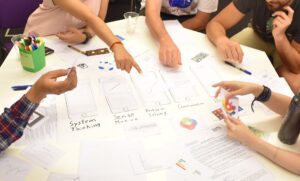Time: 10:00 AM
Location: CIC Ideation Studio
This is a PhD Stage 3 seminar to present and discuss the overall research project’s goals, findings and contributions. All are welcome to attend, and to provide constructive feedback that will assist the student in preparing the thesis for submission.
Thesis Title: Engaging stakeholders in the learning analytics design process
PhD candidate: Carlos Gerardo Prieto Alvarez
Postgraduate students designing their own mobile analytics dashboard
Abstract
Learning Analytics (LA) is a new promising field that is attracting the attention of education providers, including teachers, learning designers and academic directors. Researchers and practitioners are interested in learning analytics as it can provide insights from student data, for example, students’ learning processes, automatically identifying learners in need and visualising learners’ behaviour. However, problems such as low educator satisfaction, steep learning curves, misalignment, lack of engagement with learning technologies and other barriers to learning analytics development have already been reported. From a human-centred design perspective, these problems can be explained due to the lack of stakeholders’ involvement in the design of the LA tools. In particular, learners and teachers are commonly not considered as active agents of the LA design process. Including teachers, learners, developers and other stakeholders as collaborators in design (Co-design) bring promising benefits in democratizing, aligning and acknowledging stakeholders’ expectations. Working in collaboration with stakeholders to design LA innovations opens a series of questions that are addressed in this research work as the first step in closing the gap for effective Co-design:
1) What are the obstacles and challenges to engaging stakeholders in the learning analytics design process?
2) What design techniques and tools can be used to facilitate the integration of diverse stakeholders’ perspectives about learning analytics?
3) What’s the role of the Co-design practitioner when assisting stakeholders’ collaboration in the learning analytics design process?
Based on co-design principles, I explore the critical role of engaging stakeholders who are often neglected but who will ultimately be the main beneficiaries of learning analytics innovations. In this research work, three case studies have been used to test, analyse and verify diverse learning contexts across a university to generate a Co-design toolkit and methodology including i) academics and learners engaged in simulation-based healthcare scenarios, ii) academics and learners in a Master program on Data science, and iii) academics and tutors interested in providing personalised feedback at scale.
This thesis presents 3 key contributions required for effective collaboration in the design process of learning analytics tools:
a) Identify the mostly overlooked issues and challenges faced when working with diverse stakeholders in the distinctive field of learning analytics design. Inspired by key challenges reported in classic and contemporary Co-design literature and in current research in learning analytics, the following challenges particularly associated with the design of LA tools including asymmetric power relationships, surveillance, learning design, teaching/learning expertise and data/algorithm literacy.
b) A Co-design toolkit including techniques applied across multiple case studies adopt/adapting the required co-design techniques. The presented toolkit is intended to be used not only by designers but everyone who is interested in participating at any stage of the design process.
c) Guidelines on the role of the Co-design practitioner when working with multiple tools and methods in a collaborative driven iterative design process.
Short bio
Carlos Prieto Alvarez is a PhD candidate in the Connected Intelligence Centre (CIC) of the University of Technology Sydney. His research is focused on Co-design, Human-Computer Interaction and design for Learning Analytics. He is interested in research collaboration for participatory methods, data-driven design and technology enhance learning.
